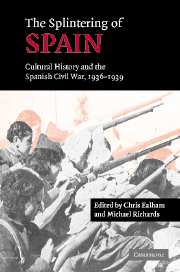Book contents
- Frontmatter
- Contents
- List of illustrations
- List of maps
- List of contributors
- Preface
- List of abbreviations
- Chronology
- Maps showing the division of Spain, 1936-1939
- 1 History, memory and the Spanish civil war: recent perspectives
- Part I Overviews: violence, nationalism and religion
- Part II Republican political and cultural projects
- Part III Identities on the Francoist side
- Notes
- Index
1 - History, memory and the Spanish civil war: recent perspectives
Published online by Cambridge University Press: 28 July 2009
- Frontmatter
- Contents
- List of illustrations
- List of maps
- List of contributors
- Preface
- List of abbreviations
- Chronology
- Maps showing the division of Spain, 1936-1939
- 1 History, memory and the Spanish civil war: recent perspectives
- Part I Overviews: violence, nationalism and religion
- Part II Republican political and cultural projects
- Part III Identities on the Francoist side
- Notes
- Index
Summary
For decades the historiography of the Spanish civil war was dominated by ‘grand narratives’ which focused primarily on the conflict's origins and outcome. Historical time in Spain was marked and measured according to the chronology of the rise and fall of the Franco regime (1939–75). Interpretation was primarily moulded by the unavoidable reality of the polarised positions of the war itself and judgements about each of the competing sides. Within Spain, the official bi-polarity, as depicted in the 1940s and 1950s, verged on the metaphysical – the division was between the forces of ‘good’ and ‘evil’, or ‘Spain’ and ‘anti-Spain’, the latter including regional nationalists, democratic liberals and working-class radicals singled out for repression. Outside Spain, simplistic Manichean myths were almost as persistent. In the extent of its over-simplification, the explanatory framework of ‘communism versus fascism’ went further than the other principal depiction of the war in the popular imagination as a struggle between ‘democracy’ and ‘fascism’. The latter representation of the war, however, was also somewhat misleading, not least because it manifestly failed to incorporate adequately the fiercely contested social revolution which took place in republican Spain during the first year or so of the conflict.
To an extent, this liberal-democratic framework overlapped with another rigid structure of interpretation that depicted the war as a struggle between ‘modernity’ and ‘tradition’.
- Type
- Chapter
- Information
- The Splintering of SpainCultural History and the Spanish Civil War, 1936–1939, pp. 1 - 20Publisher: Cambridge University PressPrint publication year: 2005
- 2
- Cited by



